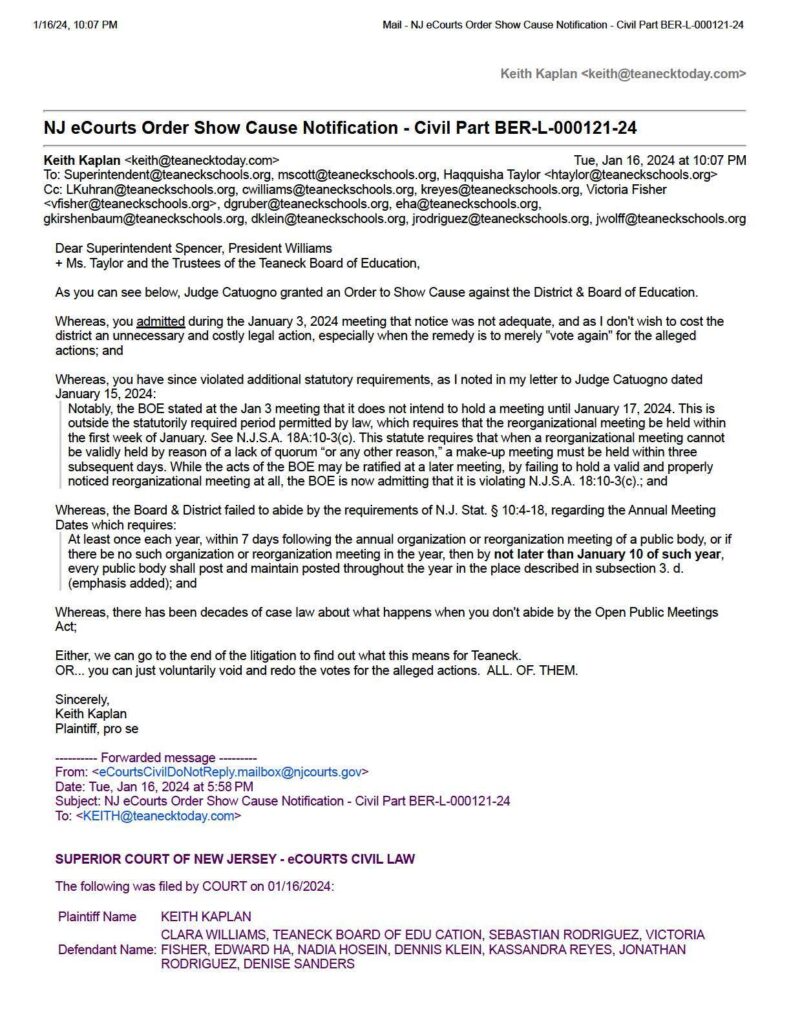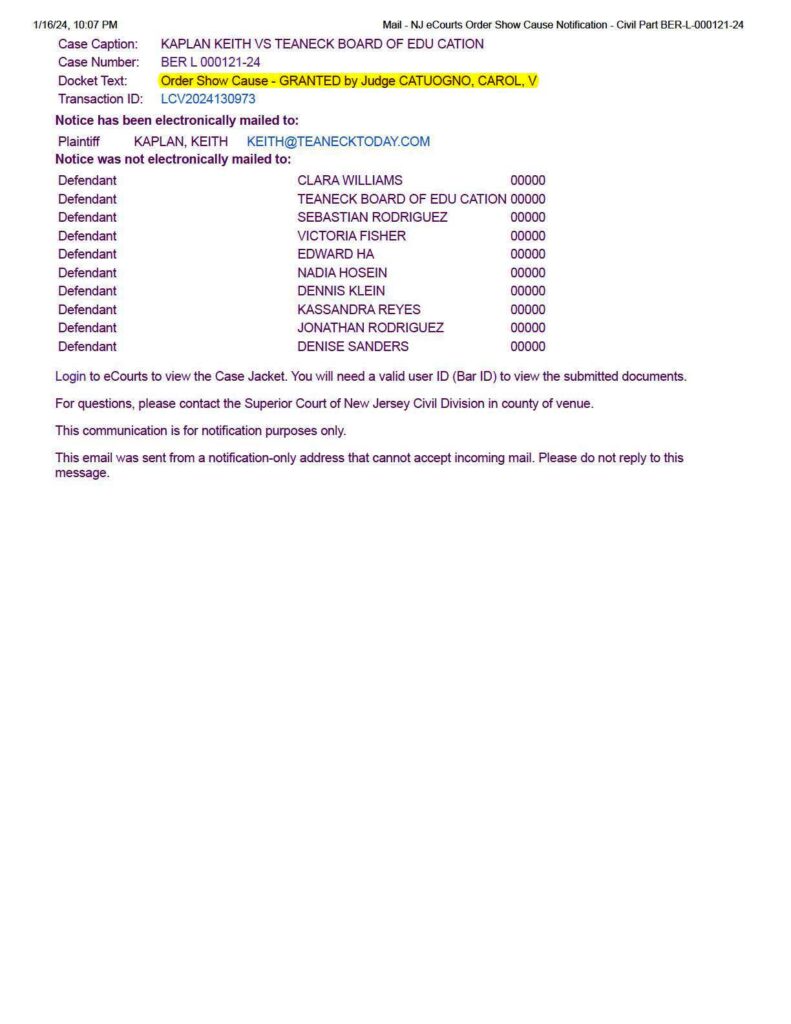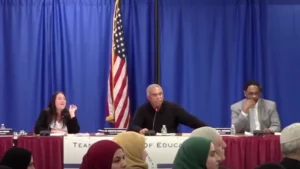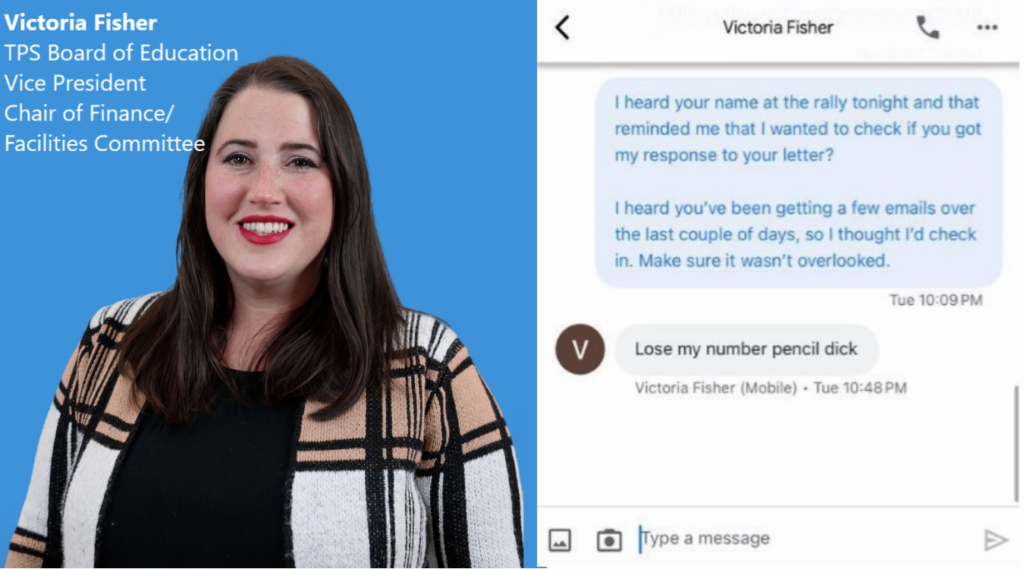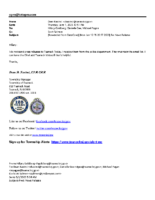The request to bar particular media from equal access is a frontal assault on a core American value. It should interest the whole country.
- 3/6/23: Hillary Goldberg is sued (in her individual capacity) for defamation [docket here].
- 5/30/23: Teaneck Today reported that Goldberg’s Motion to Dismiss the Complaint was denied.
- 6/1/23: Thirty-five hours after Teaneck Today posted the news about her case, Councilwoman Goldberg demanded Township ‘Press Releases’ stop flowing to Teaneck Today.
Was this an ‘official’ act of retaliation against unfavorable press?
On May 30th, 2023, Teaneck Today reported that Bergen County Superior Court Judge Anthony R. Suarez had denied a motion to dismiss the complaint brought by Wayne Puppies against Hillary Goldberg.
The news story contained the opinion by Judge Suarez denying a motion by Hillary Zaer Goldberg to dismiss the charges that Goldberg defamed Wayne Puppies.
Shortly after, she sent multiple emails to the Township Manager (Dean Kazinci), cc’ing the Town’s Mayor (Michael Pagan), Deputy Mayor (Danielle Gee), and Township Attorney (Scott Salmon), requesting the Township turn off the spigot for official information sent to press. In her initial email, she called Teaneck Today “a toxic Facebook group”.
A note for the sake of transparency: Goldberg is a member of the Facebook group

Kazinci declined to comment on the story. Township attorney Scott Salmon, who started working for the Township on May 23 (a week prior), indicated he would not be commenting on this piece or answering whether legal questions about the issues were discussed.
I reached out to the plaintiff’s attorney in the Wayne Puppies defamation action but did not get a response.
Requests for comment to Pagan, Gee, and Goldberg have gone unanswered (if responses come in after publication, they will be appended to the story).
The first email
On June 1st, at 5:06 AM [35 hours after the story about Wayne Puppies], Councilwoman Hillary Zaer Goldberg emailed the Township Manager:
“Dean why is Teaneck Today on the list for press releases??! That is a toxic Facebook group, not a news source that should be on a press release distribution group.”
Why would a sitting member of the governing body try to prevent residents from knowing what is happening in their town?
That’s the question I sought to answer when I discovered, within Open Public Record Act (OPRA) requests, that Councilwoman Hillary Goldberg was actively using her position on Council to interfere with timely public information getting to Teaneck Today.
It wouldn’t be the first time someone found a local council member was abusing her position to attempt to coerce employees into acting contrary to the First Amendment to the US Constitution, her oath of office, and in contravention of the law–but Teaneck Today had been on the Press Release list for months (see request to join from 2022). The Press Releases have been shared with tens of thousands, in the Facebook group (where Goldberg is herself, a member) and beyond. Goldberg had been in office for five months and cc’d on many such releases.
Why now?
Local news is a tough gig. There aren’t a lot of companies willing to devote enough journalistic resources to cover local news. As a consequence, so many stories that may matter to you and a few neighbors, often go unreported.
Teaneck Today
Teaneck Today was created in May of 2016. As its name implies, it’s a place for residents, neighbors, and friends to post issues, chat about the state of Teaneck and communicate what they are doing–today. At times, pols (including the current Mayor and several members of the Council) have used the forum to disseminate information.
Some posts range from the mundane (potholes, leaves, and snow complaints), and some are deeply personal (cuts by BOE for special-ed classes) and some are just politically fraught (Council removal of individuals from boards) with proponents and detractors commenting to and at each other. It’s a common occurrence to hear people claim it’s an echo chamber (an ironic thing that true echo chambers typically don’t exhibit).
At current, there are approximately 9k+ members, with more going to sources on the web (TeaneckToday.com) and signing up for the mailing list.
I (Keith Kaplan) run the group and I’ve long been a fan of getting as much information as possible (including source materials) out to the public–through whatever means are available.
As many know, I post to Facebook (via the Teaneck Today group), I email information (sign up here) and I post on the web.
A simple philosophy: The answer to censorship and bad speech is not more of the same
Those who regularly read my columns know that my answer to “bad” or “wrong” speech is more speech, better speech. For those reasons, I discuss issues, I post source documents, and I attempt to explain what happens behind the closed doors of government.
The OPRA request (Open Public Records Act)
To that end, I’ll often submit requests to “OPRA” on various topics, such as Cannabis (we never saw the town release the results of the town-wide poll, why is that?) or Zoning (new AirBNB legislation just went into effect, which will cost residents more money to offer homes for use). I’ll also request information regarding litigation.
As Gerard DeMarco wrote in the Daily Voice last week:
“Keith Kaplan, a former councilman himself, has rigorously kept township residents and business owners informed for more than five years through his “Teaneck Today” blog.
“Teaneck Today” also has a Facebook group with more than 8,900 members.
Combined, both have been invaluable resources, reporting and providing information on elections, building in town, school calendars, roadwork, COVID developments and more in much the way a weekly newspaper would.
Like most bloggers, Kaplan has his causes, as well as his targets.
One of those targets, Councilwoman Hilary Goldberg, was part of a three-woman slate that bounced him from office in last November’s election.
After Goldberg was sued by a pet store hoping to set up shop in Teaneck, Kaplan provided blow-by-blow accounts and published legal filings without editorializing about it.”
You can read that article here:
Wayne Puppies took Hillary Goldberg to Court. What happened next might shock you…
I had requested back in 2022, to be added to the Teaneck Police Department list for Public News Releases. The list is public, any news org can join (there are scores of emails on the list at present) and when I receive news releases, I share them with you, the public.
Hillary Goldberg ran on a platform of transparency, but in private, she is trying to prevent access.
Ironically, obtaining information from Government actors that they are trying to hide via OPRA, was the subject of a campaign video from Goldberg, herself.
State Law Requirements and Teaneck’s Form of Government
Teaneck operates under the Council-Manager form of Government as created in the Faulkner Act. Under our somewhat unique form of government, the members of the Township Council act solely as a body, and any requests/demands must be made by the body to the Manager. As the Manager is the executive office of the municipality, and the authority of the Council is solely as a body, there’s a specific requirement to guard against incursions to the manager’s authority in State Statute.
It is the intention of this article 1 that the municipal council shall act in all the matters as a body, and it is contrary to the spirit of this article for any of its members to seek individually to influence the official acts of the municipal manager, or any other officer, or for the council or any of its members to direct or request the appointment of any person to, or his removal from, office; or to interfere in any way with the performance by such officers of their duties. The council and its members shall deal with the administrative service solely through the manager and shall not give orders to any subordinates of the manager, either publicly or privately. Nothing herein contained shall prevent the municipal council from appointing committees or commissions of its own members or of citizens to conduct investigations into the conduct of any officer or department, or any matter relating to the welfare of the municipality, and delegating to such committees or commissions such powers of inquiry as the municipal council may deem necessary. Any council member violating the provisions of this section shall, upon conviction thereof in a court of competent jurisdiction, be disqualified as a council member.
NJSA 40 § 69A-91
Timeline:
- May 26, 2023: Judge Suarez denies Goldberg’s motion to dismiss the defamation claims against her in her individual capacity
- May 30, 2023: Teaneck Today reports the result of the Motion to Dismiss and publishes the opinion from Judge Suarez
- June 1, 2023: Councilwoman Goldberg, in her official capacity attempts to have news@teanecktoday.com removed from the Teaneck Police Department PR listing.
“Dean why is Teaneck Today on the list for press releases??! That is a toxic Facebook group, not a news source that should be on a press release distribution group. Please either remove Keith- he can opra like everyone else.”
- June 1, 2023: Manager Kazinci responds to Councilwoman Goldberg that the Police Department maintains the list, but if she wishes, others can be added (e.g. Teaneck Voices)
“Hillary:I do not send press releases to Teaneck Today. I receive them from the police department. They maintain the email list.I can have the Chief add Teaneck Voices if that’s helpful.”
- June 1, 2023: Township attorney responds with [redacted] legal advice to the Manager.
At this point, the matter should be settled. But Councilwoman Goldberg is not done.
- June 1, 2023:Councilwoman Goldberg asks the manager:
“Do we know how Keith got himself on that list? If Keith is on there so should Bill Orr, Chuck, Alan and Stephen Gruber.”
This begs the question as to why those others “should be” on the list. Anyone may request to be added to a Press Release list. The Appellate Division in In re January 11, 2013 Subpoena by the Grand Jury of Union Cnty., N.J. discussed the statutory factors regarding who may receive the benefit of press-shield laws, and such, but assuming they meet the generally accepted criteria, anyone requesting, should have been added to the PR list.
Did they ever request to be on the list and find themselves denied? No. A request for information to the municipality found no one was denied.
Is it acceptable for a Government agent to request certain “news” orgs be added to a list?
For the sake of clarity – all should agree that if those organizations meet the criteria, and request to join, they should be added.
The question is whether or not organizations that are “favored” by one pol can be added for access at that pol’s request.
And what is it about those particular individuals Goldberg mentions that merit their inclusion on the release list, even as Councilwoman Goldberg seeks to have Teaneck Today removed?
Is it because Goldberg considered Teaneck Today a “toxic Facebook group, not a news source”, while she views those other outlets differently?
Content-Based Distinctions by Government Actors
In REED et al. v. TOWN OF GILBERT, ARIZONA, et al., the US Supreme Court stated:
Because content-based laws target speech based on its communicative content, they are presumptively unconstitutional and may be justified only if the government proves that they are narrowly tailored to serve compelling state interests. E.g., R. A. V. v. St. Paul, 505 U. S. 377 . Speech regulation is content based if a law applies to particular speech because of the topic discussed or the idea or message expressed. E.g., Sorrell v. IMS Health, Inc., 564 U. S. ___, ___–___. And courts are required to consider whether a regulation of speech “on its face” draws distinctions based on the message a speaker conveys. Id., at ___.
Whether or not Councilwoman Goldberg considers the opinions in Teaneck Today to be “toxic”, she may not target them with official action based on the communicative content or because of the topic discussed or the idea or message expressed (although she’s free to remove herself from the group).
To demand that the manager take such action also violates the NJ Statute (40:69A-91).
Later in the afternoon, the manager told Councilwoman Goldberg that:
1) he doesn’t maintain the list and
2) if she has an issue with it, perhaps they can post them publicly elsewhere e.g. Facebook:
“I do not maintain the news media list. I’m going to speak to [town attorney] Mr. Salmon. As this appears to be an issue, it may be easier to just post releases on the TPD Facebook page which is open to the public.”
– Dean Kazinci to Hillary Goldberg
And Councilwoman Goldberg responds, removing all doubt as to what her issue truly is:
At the end of the day I am fine with the real press (emphasis added) of course. But either all the Teaneck media
(Voices, Blue, Today, Tomorrow, and Newsroom) gets it or none and they all go via opra. Keith cannot get special
treatment.
Thanks please let me know asap.
Hillary
Special Treatment?
Teaneck’s Manager, Dean Kazinci is a man of principle and would not offer or accept special treatment. He responded to that charge quickly:
Hillary:
Keith does not get and/or receive special treatment. If you know of someone who is doing so that violates any of our internal rules or regulations, please let me know. I will address it immediately. I’m sure Keith submitted something to the PD under Teaneck Today for press releases.
The final demand:
“Keith knows to inquire….
Again please either remove Keith and only the formal press gets them and Keith can get from social media.”
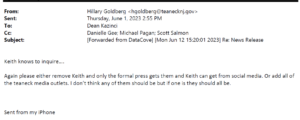
I do know to inquire – just like I know that a government actor seeking to define a “news” organization as “legitimate” is going to fail out of the gate (NJ has extended bloggers and other news protections, including media shield laws). I also know that choosing one type of speech (Teaneck Tomorrow or Voices, etc..) over another like Teaneck Today, is an outright violation of the First Amendment Councilwoman Goldberg gave an oath to uphold.
The demand to have the Manager and Police Chief remove someone, based on their opinions and the content of their ideas is certainly a colorable violation of 40 § 69A-91, which ends with:
“Any council member violating the provisions of this section shall, upon conviction thereof in a court of competent jurisdiction, be disqualified as a council member.”
Councilwoman Goldberg, if you attempt to block access to public information again, you may well find yourself in court.
Emails obtained from Open Public Records Act request:
